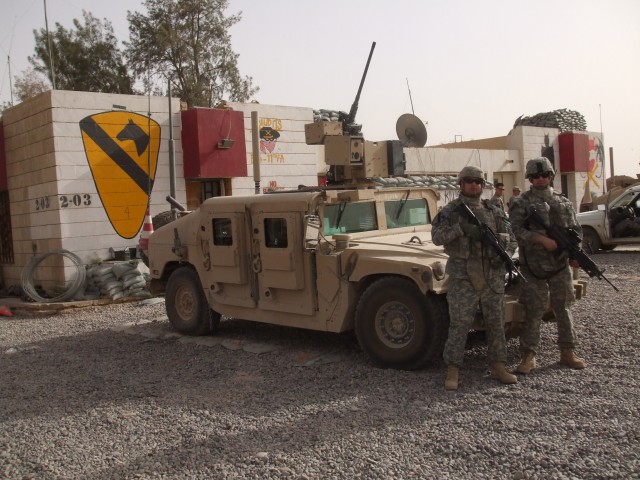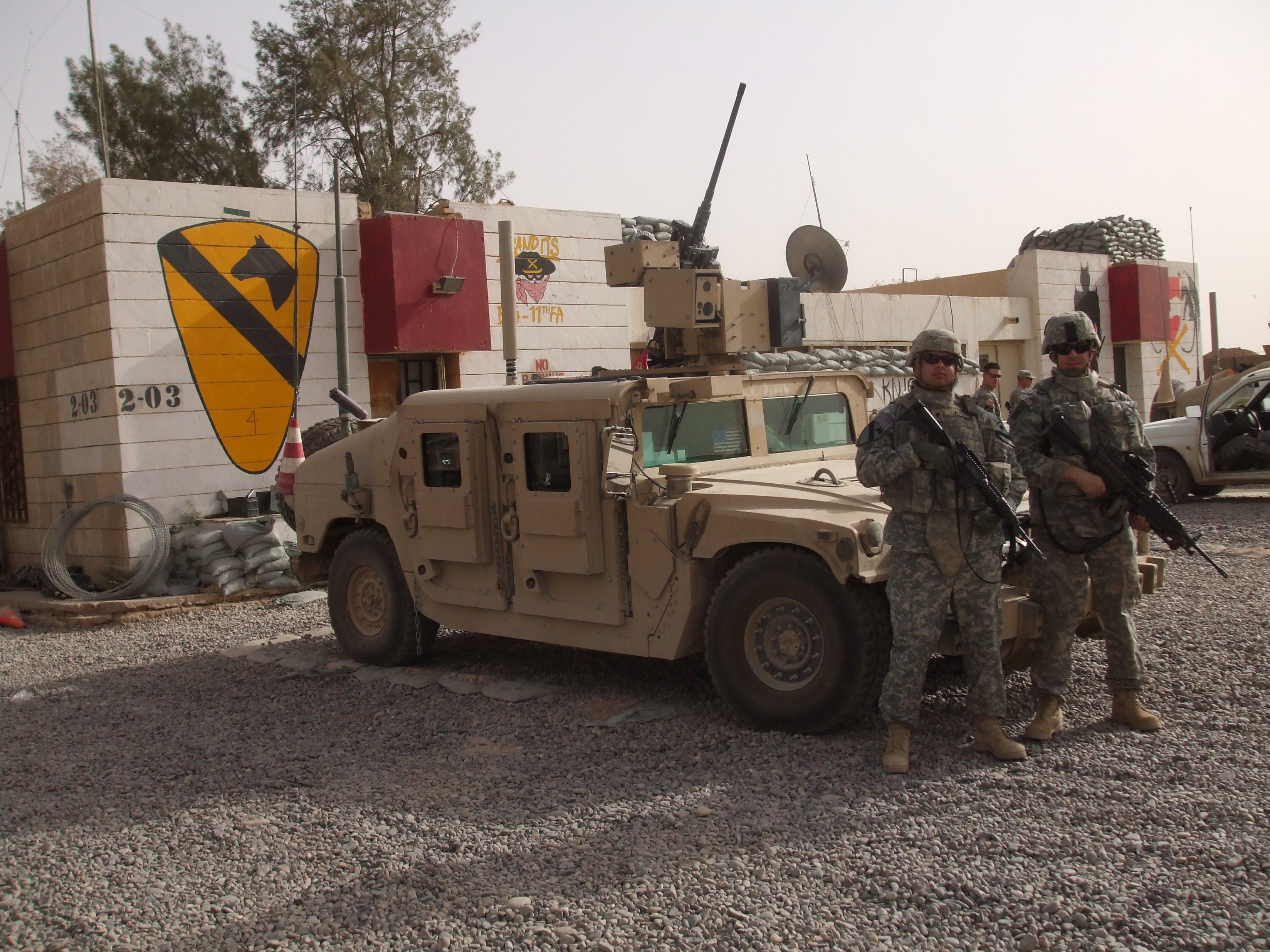When Sgt. 1st Class Dale Shavalier came to the U.S. Army Recruiting Command six years ago, he thought his weapons maintenance days were done. And that prospect was fine with him.
But, now that he's in Iraq, he's not minding the tedious task so much.
"I am really enjoying myself," said Shavalier. "I did not realize how much I missed the operational Army. The smallest things, like cleaning my weapon, which once seemed to be a pain are the things I enjoy the most."
But Shavalier hasn't left recruiting for good. He's on a year-long deployment as part of a USAREC option that trains select recruiters as career counselors and deploys them on temporary change of station orders to a unit in the operational Army. USAREC Soldiers go with the unit to support either Operation Iraqi Freedom or Operation Enduring Freedom. When the assignment is complete, the recruiter returns to USAREC.
Shavalier hopes getting reacquainted with his weapon and performing other soldierly duties in a combat zone will help him work better with detailed recruiters who have similar experiences. Sgt. 1st Class Eugene Barnes agreed.
"As a 79R, connecting with the detailed recruiter was getting harder and harder, due to the lack of deployment knowledge of the 79R," said Barnes, who is deployed to Afghanistan as part of the program. "At least now I can relate to the detailed recruiter going on recruiting duty after being deployed 12 to 15 months."
Brian Damron is pleased to hear that the Soldiers are seeing that benefit.
"The biggest issue was that 80 or 90 percent of the detailed recruiting force in the command had been deployed to this war," said Damron, chief of personnel proponency at USAREC headquarters. He said there was "a little gap" between the career recruiters and some in the detailed force. Damron said USAREC leadership saw evidence of that on their visits to the field and knew it was important for recruiters to have operational Army experience.
USAREC Command Sgt. Maj. Martin Wells said he couldn't be more proud.
"These warriors personify the true spirit of selfless service, courage, dedication and professionalism," said Wells. "Each of them has successfully embraced the challenge of being trained and becoming skilled technicians in a specialty that was new to them up until a year ago."
Trying to talk to applicants about the Army without recent field time also was becoming an issue for recruiters, said Sgt. 1st Class Froilan Arias.
"I really wanted to know and experience it myself before I asked another young man or woman to enlist," said Arias, who is currently in Iraq.
That was one of the reasons Barnes volunteered for the program. He said he hopes he will be able to "relate to the applicants and the applicants' loved ones' questions and concerns in reference to that applicant's possibility of deploying."
Having recruiters work as career counselors also fills a need in the operational Army. Damron said newly established brigade combat teams lacked career counselor authorizations. Col. James Comish, commandant of the Recruiting and Retention School, saw the unique opportunity to work with Human Resources Command and the Army by supplying career counselors. That, in return, gave recruiters the field time they needed.
"It just clicked," Damron said. "We helped the Army and they helped us."
The Road to Deployment
Shavalier, Barnes and Arias are three of the six recruiters who were selected for the first year of the 79R-79S augmentation program. Sgt. 1st Class Journey Stewart is also serving in Afghanistan, and Sgt. 1st Class Gregory Hubby and Sgt. 1st Class Erik Romero are in Iraq. Barnes, Stewart and Hubby each served in the Middle East in 1991 for Operation Desert Storm. Shavalier deployed to Kuwait in 2001; Arias and Romero are on their first deployments. Each of them is a father and says his family is what he misses the most.
To be considered for the program, Soldiers submitted packets to USAREC, and a "paper board" led by Sgt. Maj. Merle Henry of the Fort Knox, Ky., retention office selected the most qualified candidates.
The Soldiers underwent pre-career counselor course training and then attended the Basic Career Counselor Course at the Recruiting and Retention School at Fort Jackson, S.C. They are awarded 79S as a secondary MOS.
"It was probably the hardest course I have ever had," said Romero. Master Sgt. Jamie Smith, USAREC's retention NCO, said the demands of the course are great because of the attention to detail required when dealing with dates for assignments and thousands of dollars in bonuses.
After graduation and some leave, the Soldiers were sent to the Combat Readiness Center to prepare for the deployment itself.
"It gives them five days of train-up on ... weapons qualification, NBC training, first aid, things they haven't had" since they were assigned to USAREC, Damron said.
From there, it was on to a plane headed to the area of operations. Romero, Shavalier, Barnes and Arias deployed in January, Stewart in February and Hubby in June.
Recruiting versus Retention
The Soldiers, all interviewed via e-mail, each reported some similarities between their jobs as recruiters and career counselors.
"The similarities surround the interview process and determining needs, wants and desires," said Hubby. "The difference is that when dealing with Soldiers there is less fear of the unknown. It is a bit more centered around professional development."
Like recruiting, retention NCOs must make a mission. But unlike USAREC, the mission is annual, not monthly.
"There is no great sense of urgency to write the contract, as it is a yearly mission," said Stewart. "We do have a glide, but there are up and down times."
Barnes said working with Soldiers instead of civilians makes a difference because a Soldier already knows about the Army.
"They usually know what they want as far as options are concerned," he said.
Days working as a career counselor are spent screening records, counseling Soldiers, coordinating reenlistment ceremonies, processing requests and advising the commander on the retention matters, Shavalier said. He emphasized that both missions essentially are working toward the same goal.
"Overall both missions have one underlying importance: providing and maintaining the strength of our Army," he said. "Both recruiting and retention have to make their assigned missions so we can continue to be a strong, successful Army."
But the current mission is in Iraq or Afghanistan, and the conditions are different.
"The difference is being located in a combat zone," said Romero. "This really makes me appreciate how good I had it in USAREC."
Life in the Operational Army
Hubby and Stewart both have been assigned to USAREC for 10 years. They said things have changed during that time.
"Returning to the operational Army after being gone for some time is enlightening as a lot has changed," Stewart said. "The M-4 is a great weapon. There are many differences. The training that takes place is tremendous. Tactics have changed."
But being in the field also presents a living environment much different from what these recruiters are used to, although they seem to be taking it in stride. Arias even said he was pleasantly surprised to find a variety of fast food options, as well as Morale, Welfare and Recreation facilities like a gym, a movie theater and a PX at many of the camps.
"Amenities are great here in LSA Anaconda," he said. "Definitely not what I expected."
Housing, however, seems to vary widely for each of the six Soldiers. While Stewart said he "got lucky" by landing a modular housing unit with concrete floors and having only one roommate, the others are living in everything from shipping containers to trailers to something called a Bhut.
"At Bagram we live in Bhuts, which is a plywood little building," said Barnes. "We have cots to sleep on; it really is not bad at all."
Luxuries like air conditioning, cable, Internet access and indoor plumbing are found here and there.
It's a Small Army
Back in the operational Army, Romero said he's enjoyed meeting former recruiters and trading stories. And Hubby said he was surprised when a Soldier he recruited walked into his office.
For Barnes, the experience is showing him the connection between recruiting and retention. He said he's hoping to find ways Soldiers in the two career fields can work together.
"I have seen many situations when the Soldier has not been paid their enlistment bonus," he said. "They come to us, and we cannot find the enlistment contract in (the system). I have had to call back to USAREC headquarters, trying to find out where I can get a copy of the enlistment contract in order to get the Soldier paid, and every time headquarters has been very helpful."
Arias said the reach of influencers is still great. He said many Soldiers have deployed more than once and feel a pull from their families when the time comes to decide about reenlisting.
"Soldiers want to reenlist," Arias said. "They are fully aware of our pace and multiple deployments, and even so they stay committed. We do lose Soldiers for the very same reason, but the majority reenlist."
Each recruiter noted that his unit met or exceeded retention goals for the year.
The Road Ahead
Damron said 14 Soldiers applied and 11 were selected to augment the career counselor mission for FY 08. They will begin to deploy in January, as most in the first group begin to return to USAREC.
Among those selected to deploy next year is Sgt. 1st Class Charles Washington of the 3d Medical Recruiting Battalion. He said he volunteered with the hope that the assignment would "help with career progression."
"I expect this deployment to be a powerful experience for my leadership, professional, and personal growth," he said.
Barnes, Shavalier, Romero, Hubby, Arias and Stewart likely will have a thing or two to show for this phase of their careers. They plan to have some family time when they return, and they are enthusiastic about getting back to USAREC with their newfound experiences.
"I will be ready to continue my duties as a station commander," said Shavalier.
He and the others will be armed with an understanding that can only come from a deployment.
And from time spent cleaning weapons.


Social Sharing